问题1:
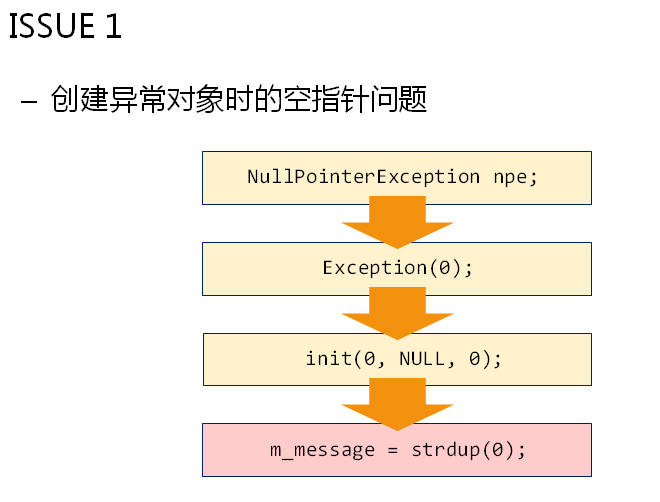
glibc中的strdup实现如下:

没有对参数s进行空指针判断。
我们的Exception.cpp中应做改进:
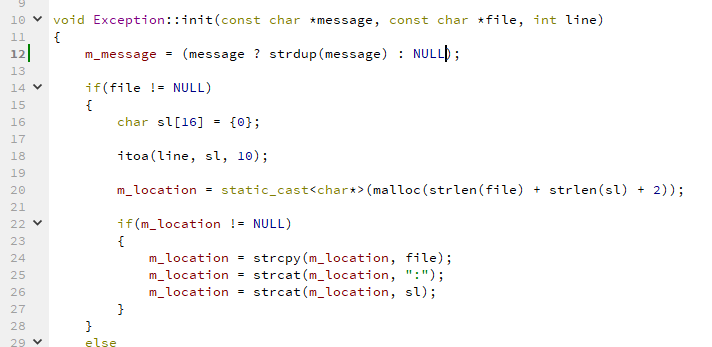
在第12行进行判断空指针操作。
问题2:
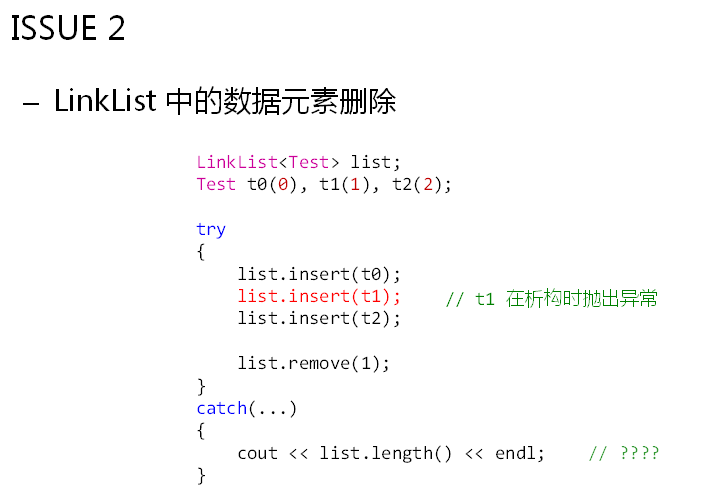
t1在析构时会抛出异常,我们在remove一个对象时,要保证链表还是合法的,也就是保证异常安全性。
如上图,我们期望打印的链表长度为2。
示例程序:
1 #include <iostream> 2 #include "LinkList.h" 3 4 using namespace std; 5 using namespace DTLib; 6 7 class Test : public Object 8 { 9 int m_id; 10 public: 11 Test(int id = 0) 12 { 13 m_id = id; 14 } 15 16 ~Test() 17 { 18 if( m_id == 1 ) 19 { 20 throw m_id; 21 } 22 } 23 }; 24 25 int main() 26 { 27 LinkList<Test> list; 28 Test t0(0), t1(1), t2(2); 29 30 try 31 { 32 list.insert(t0); 33 list.insert(t1); 34 list.insert(t2); 35 36 list.remove(1); 37 } 38 catch(int e) 39 { 40 cout << e << endl; 41 cout << list.length() << endl; 42 } 43 44 return 0; 45 }
结果如下:

程序直接崩溃了。
vc下的运行结果如下:

打印e的值为1,链表长度为3,意味着单链表的状态出问题了。
我们的remove函数没有考虑异常安全性。
修改LinkList.h:
1 #ifndef LINKLIST_H 2 #define LINKLIST_H 3 4 #include "List.h" 5 #include "Exception.h" 6 7 namespace DTLib 8 { 9 10 template < typename T > 11 class LinkList : public List<T> 12 { 13 protected: 14 struct Node : public Object 15 { 16 T value; 17 Node* next; 18 }; 19 20 mutable struct : public Object 21 { 22 char reserved[sizeof(T)]; 23 Node* next; 24 }m_header; 25 26 int m_length; 27 int m_step; 28 Node* m_current; 29 30 Node* position(int i) const // O(n) 31 { 32 Node* ret = reinterpret_cast<Node*>(&m_header); 33 34 for(int p = 0; p < i; p++) 35 { 36 ret = ret->next; 37 } 38 39 return ret; 40 } 41 42 virtual Node* create() 43 { 44 return new Node(); 45 } 46 47 virtual void destroy(Node* pn) 48 { 49 delete pn; 50 } 51 52 public: 53 LinkList() 54 { 55 m_header.next = NULL; 56 m_length = 0; 57 m_step = 1; 58 m_current = NULL; 59 } 60 61 bool insert(const T& e) 62 { 63 return insert(m_length, e); 64 } 65 66 bool insert(int i, const T& e) // O(n) 67 { 68 bool ret = ((0 <= i) && (i <= m_length)); 69 70 if( ret ) 71 { 72 Node* node = create(); 73 74 if( node != NULL ) 75 { 76 Node* current = position(i); 77 78 node->value = e; 79 node->next = current->next; 80 current->next = node; 81 82 m_length++; 83 } 84 else 85 { 86 THROW_EXCEPTION(NoEnoughMemoryException, "No memery to insert new element..."); 87 } 88 } 89 90 return ret; 91 } 92 93 bool remove(int i) // O(n) 94 { 95 bool ret = ((0 <= i) && (i < m_length)); 96 97 if( ret ) 98 { 99 Node* current = position(i); 100 101 Node* toDel = current->next; 102 103 current->next = toDel->next; 104 105 m_length--; 106 107 destroy(toDel); 108 109 } 110 111 return ret; 112 } 113 114 bool set(int i, const T& e) // O(n) 115 { 116 bool ret = ((0 <= i) && (i < m_length)); 117 118 if( ret ) 119 { 120 position(i)->next->value = e; 121 } 122 123 return ret; 124 } 125 126 T get(int i) const 127 { 128 T ret; 129 130 if( get(i, ret) ) 131 { 132 return ret; 133 } 134 else 135 { 136 THROW_EXCEPTION(IndexOutOfBoundsException, "Invalid parameter i to get element ..."); 137 } 138 139 return ret; 140 } 141 142 bool get(int i, T& e) const // O(n) 143 { 144 bool ret = ((0 <= i) && (i < m_length)); 145 146 if( ret ) 147 { 148 e = position(i)->next->value; 149 } 150 151 return ret; 152 } 153 154 int find(const T& e) const // O(n) 155 { 156 int ret = -1; 157 int i = 0; 158 159 Node* node = m_header.next; 160 161 while( node ) 162 { 163 if( node->value == e ) 164 { 165 ret = i; 166 break; 167 } 168 else 169 { 170 node = node->next; 171 i++; 172 } 173 } 174 175 return ret; 176 } 177 178 int length() const // O(1) 179 { 180 return m_length; 181 } 182 183 void clear() // O(n) 184 { 185 while( m_header.next ) 186 { 187 Node* toDel = m_header.next; 188 189 m_header.next = toDel->next; 190 191 m_length--; 192 193 destroy(toDel); 194 } 195 196 // m_length = 0; 197 } 198 199 bool move(int i, int step = 1) 200 { 201 bool ret = (0 <= i) && (i < m_length) && (step > 0); 202 203 if( ret ) 204 { 205 m_current = position(i)->next; 206 m_step = step; 207 } 208 209 return ret; 210 } 211 212 bool end() 213 { 214 return (m_current == NULL); 215 } 216 217 T current() 218 { 219 if( !end() ) 220 { 221 return m_current->value; 222 } 223 else 224 { 225 THROW_EXCEPTION(InvalidOperationException, "No value at current position ..."); 226 } 227 } 228 229 bool next() //每次移动step步 230 { 231 int i = 0; 232 233 while((i < m_step) && !end()) 234 { 235 m_current = m_current->next; 236 i++; 237 } 238 239 return (i == m_step); 240 } 241 242 ~LinkList() // O(n) 243 { 244 clear(); 245 } 246 }; 247 248 } 249 250 #endif // LINKLIST_H
在remove函数中,先让m_length--,再做摧毁节点的操作。
在clear函数中,注释掉原来的196行,添加第191行,每次摧毁前让m_length--。
问题3:
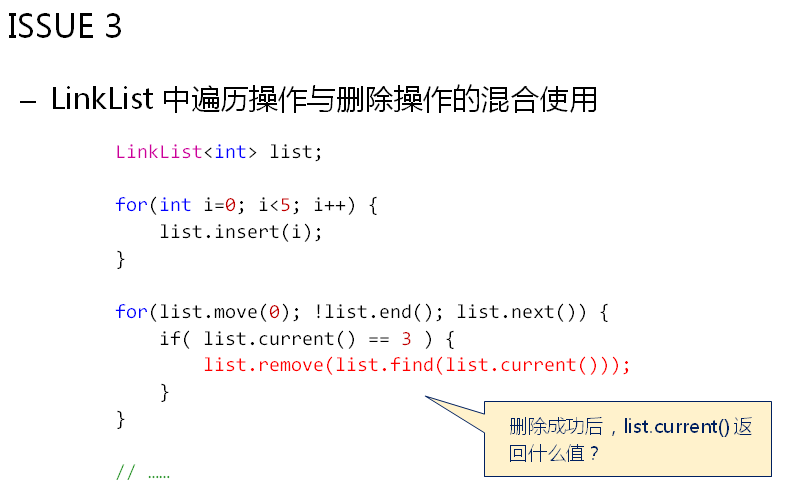
测试程序如下:
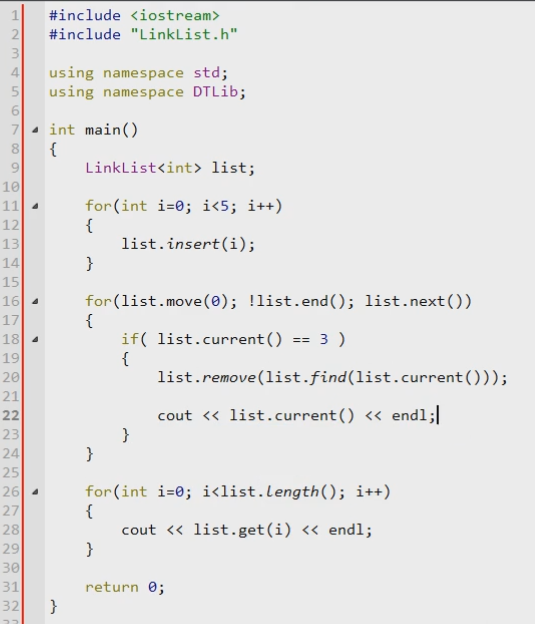
结果如下:

删除之后,游标m_current指向这个释放之后的内存,current函数返回的是这个释放了的内存中保存的value。
图解:

删除之后current函数返回的这块被释放了的堆内存中的value的值,所以会打印出随机值。
修改LinkList.h中的remove函数:
1 bool remove(int i) // O(n) 2 { 3 bool ret = ((0 <= i) && (i < m_length)); 4 5 if( ret ) 6 { 7 Node* current = position(i); 8 9 Node* toDel = current->next; 10 11 if( m_current == toDel ) 12 { 13 m_current = toDel->next; 14 } 15 16 current->next = toDel->next; 17 18 m_length--; 19 20 destroy(toDel); 21 22 } 23 24 return ret; 25 }
我们添加了第11-14行,在删除时,先进行判断,如果m_current和toDel指向的是同一个节点,那么先将m_current指向toDel的下一个节点,然后再删除。
运行结果如下:
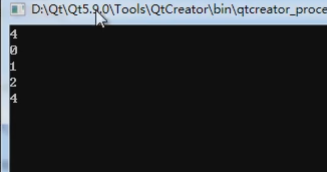
问题4:

程序改进:
1 void destroy(Node* pn) 2 { 3 SNode* space = reinterpret_cast<SNode*>(m_space); 4 SNode* psn = dynamic_cast<SNode*>(pn); 5 6 for(int i = 0; i<N; i++) 7 { 8 if( psn == (space + i)) 9 { 10 m_used[i] = 0; 11 psn->~SNode(); 12 break; 13 } 14 } 15 }
添加了第12行的break。
问题5:
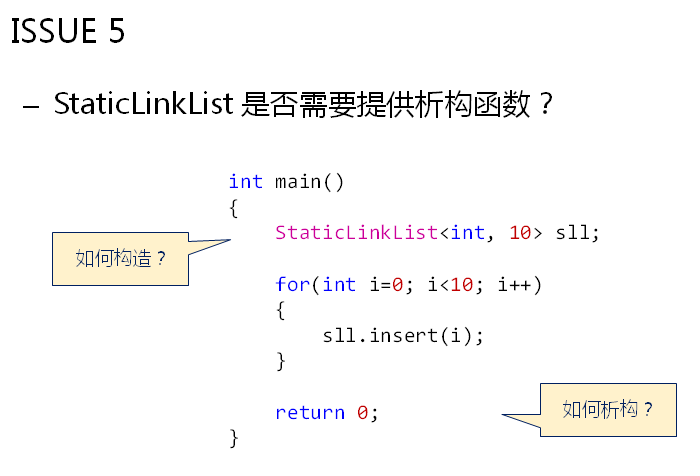
StaticLinkList的构造函数中没有申请系统资源,从资源方面来看不用提供析构函数。
不提供析构函数的第二个条件是,该类为一个独立的类,没有任何继承关系,但是我们StaticLinkList不满足。
StaticLinkList继承自LinkList,LinkList中有析构函数,且这个析构函数调用了一个虚函数,但是多态是不会发生的。
构造函数和析构函数中不会发生多态。
StaticLinkList类中没有clear函数,因此,默认的析构函数会调用到LinkList的析构函数,进一步调用到clear函数,这个clear函数在子类和在父类中调用是一样的。
如果子类StaticLinkList中也有一个clear函数版本,那就要提供析构函数了。因为这两个含本的析构函数都要调用到。
但是我们再仔细观察可以发现,在clear函数中还调用了destroy函数,而这个函数在子类和父类中各有一个版本。
子类中的版本是:
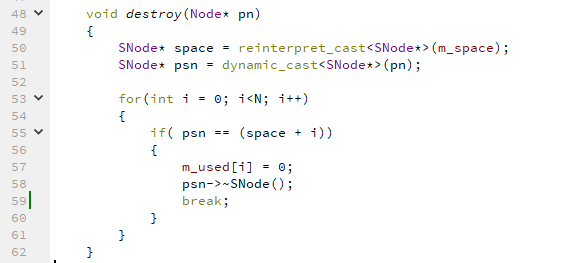
父类中提供的版本是:

这意味着父类中的析构函数被调用的时候,调用到的destroy一直是父类中的destroy。子类中的destroy无法被调用到,因为析构函数中不能发生多态。
析构时父类中的destroy直接delete掉申请的空间,而这个空间是在我们的预留区域中申请的,不是堆空间,因此,可能会出现bug,造成程序的不稳定,因为delete关键字只能释放堆空间。
改进程序,添加子类的析构函数:
1 #ifndef STATICLINKLIST_H 2 #define STATICLINKLIST_H 3 4 #include "LinkList.h" 5 6 namespace DTLib 7 { 8 9 template< typename T, int N > 10 class StaticLinkList : public LinkList<T> 11 { 12 protected: 13 // Node和泛指类型T有关系,因此,不能直接在子类中使用sizeof(Node),而应该 14 // sizeof(LinkList<T>::Node) 15 // unsigned char m_space[sizeof(typename LinkList<T>::Node) * N]; // 预留空间 16 typedef typename LinkList<T>::Node Node; 17 18 struct SNode : public Node 19 { 20 void* operator new(unsigned int size, void* loc) 21 { 22 (void)size; // 消除 size没有使用的警告 23 return loc; 24 } 25 }; 26 27 unsigned char m_space[sizeof(SNode) * N]; // 预留空间 28 int m_used[N]; //预留空间的标记数组 29 30 Node* create() 31 { 32 SNode* ret = NULL; 33 34 for(int i = 0; i < N; i++) 35 { 36 if( !m_used[i] ) 37 { 38 ret = reinterpret_cast<SNode*>(m_space) + i; 39 ret = new(ret)SNode(); //在指定空间ret上调用SNode类的构造函数。 40 m_used[i] = 1; 41 break; 42 } 43 } 44 45 return ret; 46 } 47 48 void destroy(Node* pn) 49 { 50 SNode* space = reinterpret_cast<SNode*>(m_space); 51 SNode* psn = dynamic_cast<SNode*>(pn); 52 53 for(int i = 0; i<N; i++) 54 { 55 if( psn == (space + i)) 56 { 57 m_used[i] = 0; 58 psn->~SNode(); 59 break; 60 } 61 } 62 } 63 64 public: 65 StaticLinkList() 66 { 67 for(int i = 0; i < N; i++) 68 { 69 m_used[i] = 0; 70 } 71 } 72 73 int capacity() 74 { 75 return N; 76 } 77 78 ~StaticLinkList() 79 { 80 this->clear(); 81 } 82 }; 83 84 } 85 86 #endif // STATICLINKLIST_H
添加了第78-81行的析构函数,这时的clear是从父类继承来的,但是clear中的destroy函数就是子类自己实现的了。
这样的话析构时,先调用子类的析构函数,然后是子类继承过来的clear函数,然后子类的destroy函数。子类的析构函数执行完时,再调用父类的析构函数,然后父类的clear函数,最后调用父类的destroy函数。但是单步执行时,我们发现并没有调用到父类的destroy函数,这里可能令人迷惑,其实是因为调用父类的析构函数时,clear函数中的while循环已经不成立的,也就不会再调用父类的destroy函数了。单步执行时要注意这一点,调用不到父类的destroy是因为条件不成立,而不是其他的机制导致的。如下:

从子类的析构函数执行完,到调用到父类的析构函数时,clear函数中的190行的条件已经不成立了。
我们在子类的析构函数和destroy函数,父类的析构函数和destroy函数加上打印,测试程序如下:
1 #include <iostream> 2 #include "StaticLinkList.h" 3 4 using namespace std; 5 using namespace DTLib; 6 7 8 int main() 9 { 10 StaticLinkList<int, 10> list; 11 12 list.insert(0); 13 14 cout << list.get(0) << endl; 15 16 return 0; 17 }
结果如下:
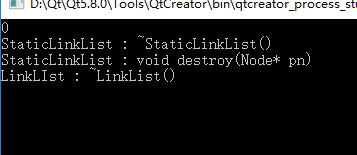
问题6:

没有必要定义多维数组的类,由一位数组就可以构成。
示例程序:
1 #include <iostream> 2 #include "StaticLinkList.h" 3 #include "DynamicArray.h" 4 5 using namespace std; 6 using namespace DTLib; 7 8 9 int main() 10 { 11 StaticLinkList<int, 10> list; 12 13 DynamicArray< DynamicArray<int> > d; 14 15 d.resize(3); 16 17 for(int i=0; i < d.length(); i++) 18 { 19 d[i].resize(3); 20 } 21 22 for(int i=0; i<d.length(); i++) 23 { 24 for(int j=0; j<d[i].length(); j++) 25 { 26 d[i][j] = i * j; 27 } 28 } 29 30 for(int i=0; i<d.length(); i++) 31 { 32 for(int j=0; j<d[i].length(); j++) 33 { 34 cout << d[i][j] << " "; 35 } 36 37 cout << endl; 38 } 39 40 return 0; 41 }
结果如下:

还可以构造不规则的数组:
1 #include <iostream> 2 #include "StaticLinkList.h" 3 #include "DynamicArray.h" 4 5 using namespace std; 6 using namespace DTLib; 7 8 9 int main() 10 { 11 StaticLinkList<int, 10> list; 12 13 DynamicArray< DynamicArray<int> > d; 14 15 d.resize(3); 16 17 for(int i=0; i < d.length(); i++) 18 { 19 d[i].resize(i + 1); 20 } 21 22 for(int i=0; i<d.length(); i++) 23 { 24 for(int j=0; j<d[i].length(); j++) 25 { 26 d[i][j] = i + j; 27 } 28 } 29 30 for(int i=0; i<d.length(); i++) 31 { 32 for(int j=0; j<d[i].length(); j++) 33 { 34 cout << d[i][j] << " "; 35 } 36 37 cout << endl; 38 } 39 40 return 0; 41 }
第19行使得每个数组元素大小不一样,运行结果如下:

实践经验:
